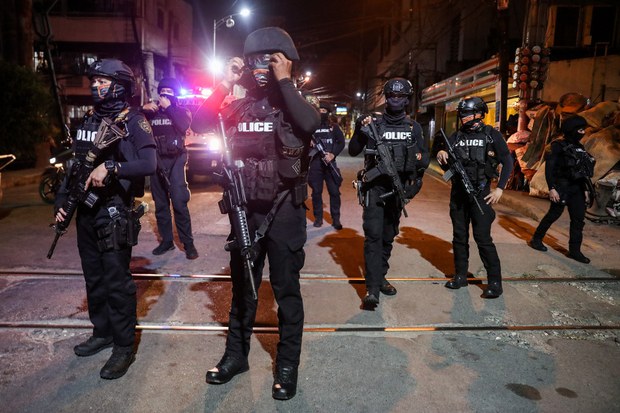Philippine Military Chief Withdraws Request for COVID Drug from China
2020.04.28
Manila and Cotabato, Philippines
 Police prepare to enforce a COVID-19 lockdown in a Manila district, April 23, 2020.
Police prepare to enforce a COVID-19 lockdown in a Manila district, April 23, 2020.
The Philippine government on Tuesday publicly defended its military chief for writing to Beijing’s ambassador to Manila to ask for help procuring a Chinese-developed anti-COVID-19 drug, which has not been approved here.
In a letter to Chinese envoy Huang Xilian, Gen. Felimon Santos Jr. said the drug Carrimycin had helped him recover from the potentially deadly coronavirus, and he intended to give the drug “to my close friends who have also been infected.”
On Tuesday, Philippine Defense Secretary Delfin Lorenzana said he spoke with Santos and he saw nothing wrong with the general’s actions.
Santos later “withdrew his request” to the ambassador upon learning that the Philippine Food and Drug Administration (FDA) had not approved the drug for use in the Philippines, Lorenzana said.
The defense secretary acknowledged that Santos’ letter “may have been out of place.”
But, Lorenzana said, Santos “had not violated any regulations nor imperiled the security of the country.”
According to the defense secretary, Santos went “through fear and anguish of being infected with a deadly virus” and the general saw nothing wrong with wanting to help those infected with the coronavirus.
In his letter, which has circulated widely on social media and caused a stir, the head of the Philippine armed forces did not name the friends he wanted to help in getting the drug for them, but said he had been cleared of the disease after testing positive for COVID-19 last month.
“With clearance from medical doctors, I took Carrimycin tablets given to me by a Chinese friend with a dosage of two tablets a day for six days,” Santos wrote, adding that he been proclaimed negative since early this month and eventually declared “recovered.”
Santos also asked for the ambassador’s “assistance in the procurement of 5 boxes of Carrimycin tablets which is available only in China.”
Carrimycin is not approved for use in the Philippines. Santos would not name the doctors he claimed had advised him to use it.
On Tuesday, the number of coronavirus infections in the Philippines rose to 7,958, with 181 news cases reported. National health authorities also recorded 19 more deaths from the virus, taking the toll in the country to 530.
Globally, more than 3 million have been infected by COVID-19 and more than 212,000 have died, according to data compiled by disease experts at U.S.-based Johns Hopkins University.
Duterte discusses restrictions
Meanwhile for weeks, the main Philippine island of Luzon has been under a government-ordered lockdown aimed at containing the spread of the coronavirus.
But in an address to the nation on Monday night, President Rodrigo Duterte spoke about potentially easing restrictions linked to the COVID-19, according to media reports.
“While others are still on lockdown, we might open partially,” Duterte said without specifying details, Bloomberg News reported.
On Tuesday, presidential spokesman Harry Roque said any lifting of restrictions in and around the capital Manila would not occur before May 15.
Also this week, the World Health Organization (WHO) advised the Philippines to start setting up systems to expedite the processing, accreditation, and the national deployment of a coronavirus vaccine, should one be developed, according to another report.
Because it could take between 12 to 18 months for a COVID-19 vaccine to come onto the market, according to the WHO’s country chief , the Philippines should for the time being come up with a plan for speeding up the vaccine’s national rollout, the Star newspaper in Malaysia quoted him as saying.
“We encourage the country to prepare its regulatory processes, in terms of the assessment and evaluation of the vaccine to help fast-track the registration of the vaccine,” said Socorro Escalante, the WHO chief in the Philippines.
“The government should also have a vaccine strategy, which would prioritize the most susceptible, such as the health care workers and those with comorbidities,” he said.







